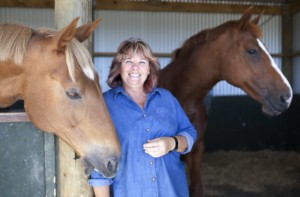
EIT Executive Dean Professor Nat Waran
Kia ora e ngā Rangatira
I hope you are all well and have survived the horrible weather we have all been experiencing. I have just returned from the UK and Switzerland, where I was involved in Chairing an international workshop as part of the work involved with an independent equine welfare Commission I am chairing, as well as giving invited talks at conferences.
It was great to reconnect with my international colleagues after so long working online, and it reminded me that you can achieve a lot more when you are able to connect face to face. However it’s great to be back in NZ, despite managing to catch COVID during my last conference and then having to spend my first week at home in isolation!
I am now ‘enjoying’ catching up with everything that has been happening while I was away. Obviously, the transition to Te Pūkenga has been front of mind for everyone and as researchers we are particularly interested to see how the important work we are doing will continue in the new setup. Certainly EIT wants to ensure that rangahau, research and postgraduate remains high on the agenda for Te Pūkenga as consultation continues around an Operating Model.
As a tertiary education organisation (TEO), we teach a range of qualifications from certificate through to post-graduate degree. The aim is to equip our akonga (learners) with the skills and qualifications for success in work and in life.
Although universities are clear that an academic cannot be a good teacher of higher-level degrees unless they are also a competent researcher, this is not always the case for all staff working in the ITP sector. However, it’s important to recognise that there are a number of good reasons why we must ensure that research and innovation remains well-supported as we transition to Te Pūkenga.
1. Research underpins our undergraduate and postgraduate degree offerings as well as informing our vocational teaching. Under the Education Act, kaimahi (staff) delivering at degree level are required to be research informed and active – and indeed our programme approvals are based upon that expectation. Each year we are expected to demonstrate activity and output when we are monitored and during self-assessment. Many of our programmes pathway learners, many of whom would not have achieved at degree or PG level at a University for one reason or another, from vocational qualifications onwards.
2. Akonga (learners) are often involved in research whether desktop or field based and as part of a course, a whole course or a significant proportion of a programme at various levels – and this needs to be guided by experienced and well qualified kaimahi who are able to convey their knowledge and enthusiasm to help support the development of learners in their learning journey.
3. Research informs practice and policy – ensuring that researchers are able to contribute to the social, economic and environmental wellbeing of our Region and Nationally and in some areas internationally – Research is an important part of our business allowing us to provide informed input to contribute to a vibrant and engaged civil society.
4. Our distinctive community centred research ensures that we meet local needs through collaboration, consideration of context and clear communication, enabling us to contribute positively to sustainable regional development. The key to our success is that our glocal research has a positive impact on our communities. We don’t research for research’s sake; we research because we want to find solutions to the issues facing our communities. I am proud that we have many examples where we have made a difference.
5. Attracting and retaining Kaimahi is always an important consideration and especially significant as we move through the change process. Research is important to many staff within the ITP (and indeed (T)ITO) sector(s), and research output has grown over past years as rangahau, research and innovation strategies have borne fruit.
6. The development of rangahau is key for Te Pūkenga and this relies on each subsidiary connecting with local iwi and hapū, giving effect to Te Tiriti by responding to the needs of Māori stakeholders. We also need to work together as a community of researchers to ensure that kairangahau are supported and enabled, to address inequities and ensure Māori culture, heritage and expertise flourishes.
There is no doubt that research should be an important tenant in the new foundation that is Te Pūkenga. Your EIT research and innovation team are doing all we can to ensure that research not only has a strong presence in the new organisation, but also has the opportunity to thrive in Te Pūkenga.
I firmly believe that EIT research will continues to be a strong voice as we evolve into Te Pūkenga, and I remain very proud of all that you have and continue to achieve despite the recent challenges through COVID, and the uncertainty related to transition that we are experiencing.
Ngā mihi nui
Nat
Professor Natalie Waran
Executive Dean
Faculty of Education, Humanities and Health Science and Professor of One Welfare

